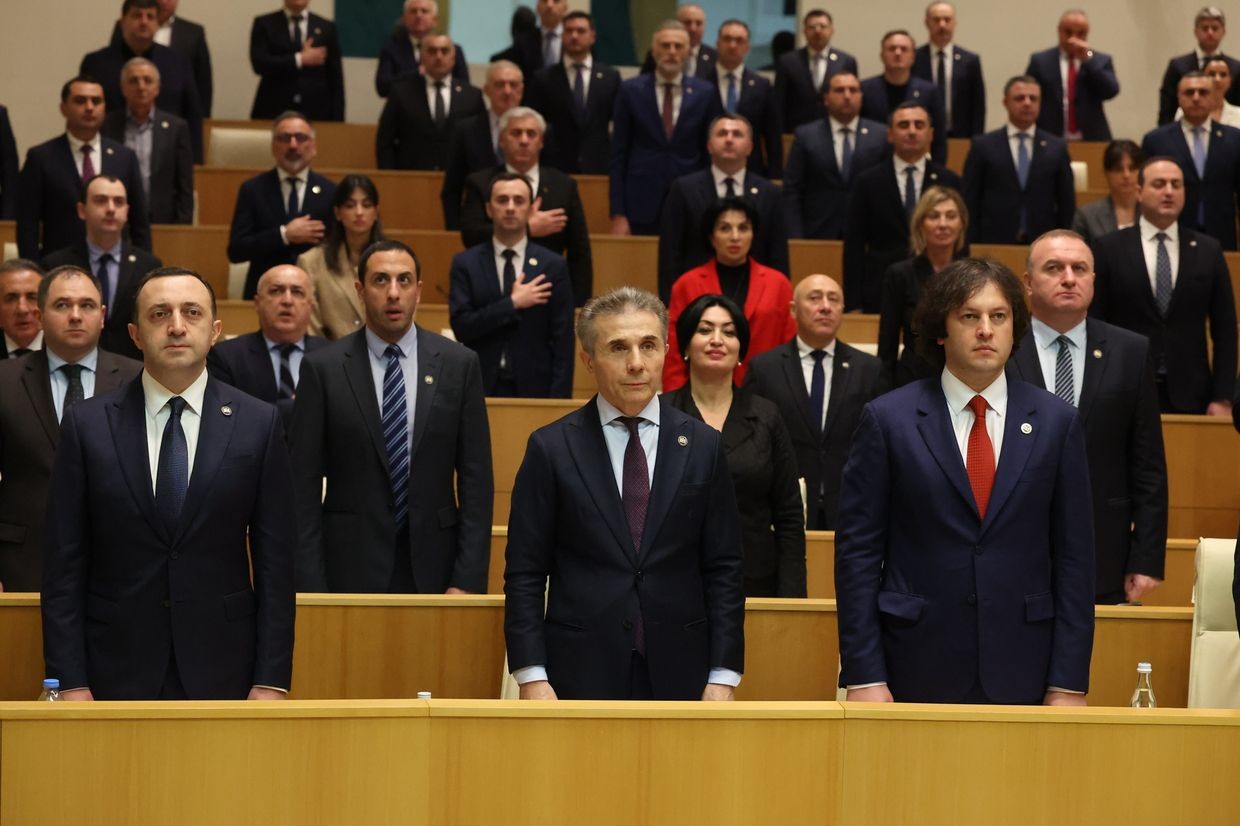Georgian Dream expels 49 opposition MPs and forms its own ‘healthy opposition’ group in parliament

The ruling Georgian Dream party has annulled the mandates of 49 MPs from three opposition groups which have already been boycotting all parliamentary sessions. Three members of Georgian Dream have also announced their resignation to create a ‘healthy opposition’ group in parliament.
The 49 members who had their parliamentary statuses revoked were from three opposition groups who surpassed the 5% electoral threshold in the October 2024 elections: Unity — National Movement, Coalition for Change, and Strong Georgia.
In November 2024, Unity — National Movement, Coalition for Change, and Strong Georgia appealed to the Central Election Commission (CEC) to annul their lists, with the CEC approving their requests within days.
The fourth group to have made it into parliament with 12 MPs, Giorgi Gakharia’s For Georgia, still has its mandates, but continues to boycott parliament.
The session to revoke the oppositions’ parliamentary statuses was only attended by Georgian Dream and their satellite group, People’s Power. They applauded the results of the vote in which only they participated. Parliamentary Speaker Shalva Papuashvili stated that ‘the constitutional response’ will always be given to ‘the blackmail of democracy’.
Georgian Dream creates a ‘healthy opposition’
In the absence of any opposition MPs in parliament, three members of Georgian Dream resigned from the ruling party to create a ‘healthy opposition’ faction within parliament.
The three MPs — Ilia Inzhia, Varlam Liparteliani, and Nika Elisashveli — emphasised that they will do everything to prevent the return of the formerly ruling United National Movement (UNM) party to power.
‘Our stance towards the radical opposition will remain as principled as it has been until now’, added Inzhia, the son of Pridon Inzhia, one of the leaders of the pro-government political party European Socialists, which did not run in October’s parliamentary elections.
The trio added that they intended to establish their parliamentary faction using the European Socialists as a platform.
Papuashvili quickly agreed to change parliamentary regulations so that the trio could create a new political group without facing any bureaucratic problems — previously, a minimum of seven MPs were needed to form a parliamentary political group. No details were provided as to how the regulations would be amended.
This yet-unnamed group is the second Georgian Dream off-shoot to appear in recent years.
In 2022, several members of Georgian Dream announced their departure from the ruling party citing the need for a more ‘open discussion’ about Georgia’s Western partners. The group was named People’s Power, and was largely viewed as a satellite group of Georgian Dream. Its members, which included Georgia’s current disputed President Mikheil Kavelashvili, authored the first iteration of the controversial foreign agent law in 2022.
People’s Power has continued to support Georgian Dream and glorify its founder and honorary chair Bidzina Ivanishvili. They also ran on the same electoral list as Georgian Dream in the 2024 elections.
A disputed parliament
Georgian Dream inaugurated parliament’s 11th convocation on 25 November amidst street protests and a boycott from the opposition.
At the time, the results of the election were still being challenged at the Constitutional Court by then-President Salome Zourabichvili and numerous opposition politicians. A number of the country’s top legal and constitutional experts have stated that opening parliament at that time was an outright violation of the constitution.
The official results of the parliamentary elections gave the ruling Georgian Dream party a majority with 54% of the vote. However, local media, observer groups, and opposition politicians have documented widespread vote rigging by the ruling party and the institutions it controls, which they argue resulted in a favourable outcome for Georgian Dream.

With the exception of a few foreign leaders, the election has not been widely recognised as legitimate, including by the EU and the US.
In mid-January, the Prosecutor’s Office stated that the preliminary findings of its investigations into the election did not show evidence of vote rigging. The Constitutional Court also rejected the appeals by Zourabichvili and the opposition challenging the constitutionality of the elections.
The elections were followed by protests across the country, with opposition to the government mounting in late November when Prime Minister Irakli Kobakhidze announced that the government was suspending Georgia’s EU membership bid.




![Baia Margishvili standing in central Tbilisi with a sign reading: ‘The Prosecutor’s Office [is] a punitive squad. How many more innocent people will you put in prison?’ Photo: Mariam Nikuradze/OC Media.](/_next/image/?url=https%3A%2F%2Fassets.bucket.fourthestate.app%2Foc-media-prod%2Fcontent%2Fimages%2F2026%2F02%2Fcalls-for-sanctions-and-raids-19-10-25-48.jpg&w=3840&q=50)





